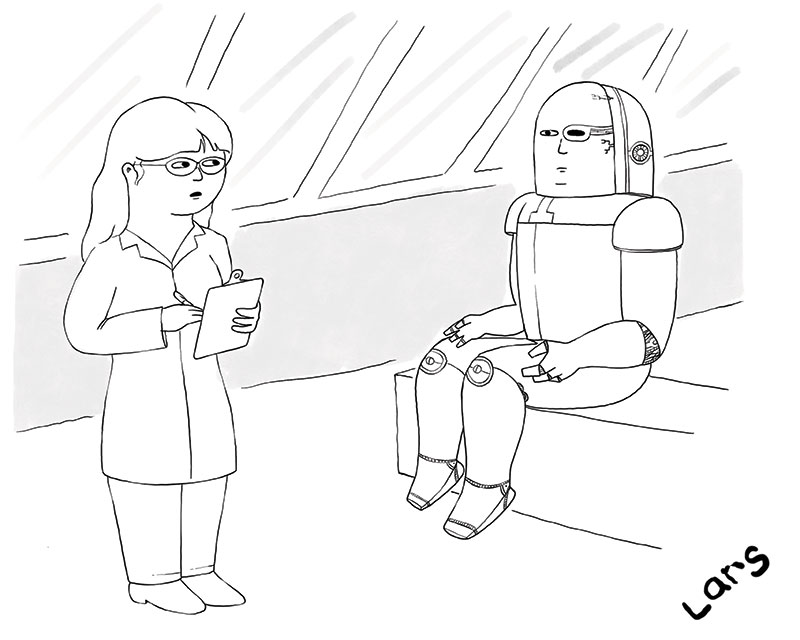 In Lars Kenseth’s drawing, a cyborg is sitting on what appears to be an examining table, while a woman who’s wearing a lab coat and writing on a clip board addresses him.
In Lars Kenseth’s drawing, a cyborg is sitting on what appears to be an examining table, while a woman who’s wearing a lab coat and writing on a clip board addresses him.
I first imagined the cyborg suffering from and seeking treatment for oxidation:
- “You need less fresh air.”
- “It’s not arthritis. It’s rust.”
I then focused on the cyborg’s left eye, which is covered as if he’s at the optometrist’s office for an exam: “Good. Now cover your other eye.”
Doctors sometimes use a small rubber hammer to tap firmly on the tendon just below the patient’s kneecap. The normal response is a “knee-jerk reflex,” but a sudden kicking movement from a cyborg could prove fatal:
- “The last doctor who tapped your knee got kicked right through the wall.”
- “Just to be safe, I’m going to stand to the side when I tap your knee.”
I then thought about the question that doctors ask to get a subjective assessment of the patient’s level of physical discomfort: “And on a pain scale of 0-10…zero again?”
I next imagined the doctor referring her patient to a specialist: “I’m going to refer you to a roboticist.”
Finally, I suggested that the cyborg’s problem was psychosomatic: “The pain is all in your head, which we can remove.”
Now let’s see how you did:
A couple of entries focused on words that have a meaning in the context of both medicine and computer technology:
- “It’s a virus.”
- “It’s a feature, not a bug.”
Other entries focused on a common complaint that affects older patients and could also be a problem for cyborgs:
- “Subject complains of stiff joints.”
- “At your age, some stiffness is perfectly normal.”
- “Any stiffness?”
Here are the week’s best sex jokes:
- “I’ve determined your sexual performance issues are due to lack of genitalia.”
- “Are you winking at me?”
- “Yes, Pfizer makes a little blue battery.”
- “You had me at I am a sex robot.”
That first caption would be better without the word “sexual”—let the final word or phrase explain the joke—and the last caption would be better without the words “I am a.”
While we’re on the topic of removing unnecessary words, consider this entry: “Honestly, Mr. Klepman, you’re running out of things to replace.” I like that, but I could do without “Mr. Klepman.” Sometimes the inclusion of a character’s name can make the caption funnier, but an unusual name is a distraction that shifts the focus away from and therefore undermines the main joke. More innocuous last names (e.g., Johnson, Jenkins, Perkins) work best. Even when you’re trying to highlight the character’s ethnic background—and in this case, the idea of a Jewish cyborg is kind of funny—go with a somewhat common ethnic name (e.g., Goldberg, Rosen, Silverman). And in this caption, I don’t think a name was even necessary.
Here’s a superior version of one of my captions: “I’m referring you to my mechanic.”
Several entries turned on the double-meaning of the word “iron.” Some suggested the cyborg did not have enough:
- “You need more iron.”
- “You have an iron deficiency.”
- “As strange as this may sound, you have an iron deficiency.”
Others suggested he had too much:
- “You’re getting too much iron.”
- “I’m stopping the iron supplement.”
These entries focused on medical histories:
- “Does your family have a history of rusting?”
- “Is there any history of mechanical failure in your family?”
Like I did, a couple of you addressed the cyborg’s left eye:
- “Now read the middle line.”
- “Are you sure you’re getting enough optic fiber?”
These next two captions come at the drawing from a psychological angle:
- “You need to control your electrical impulses.”
- “I sense some deep-seated motherboard issues.”
Finally, here are four strong captions that don’t fit neatly into any category:
- “Do you have health insurance, or at least an extended warranty?”
- “Let’s talk about that nagging metallic taste in your mouth.”
- “It appears you have a broken heart.”
- “Let’s try turning you off, and then turning you on again.”
It’s been a while since I selected a sex joke as the winning entry, so this week I’m going with, “Yes, Pfizer makes a little blue battery.”
ENTER THIS WEEK’S CAPTION CONTEST
Lawrence Wood has won The New Yorker’s Cartoon Caption Contest a record-setting seven times and been a finalist two other times. He has collaborated with New Yorker cartoonists Peter Kuper, Lila Ash, Felipe Galindo Gomez, and Harry Bliss (until Bliss tossed him aside, as anyone would, to collaborate with Steve Martin). Nine of his collaborations have appeared in The New Yorker, and one is included in the New Yorker Encyclopedia of Cartoons.

